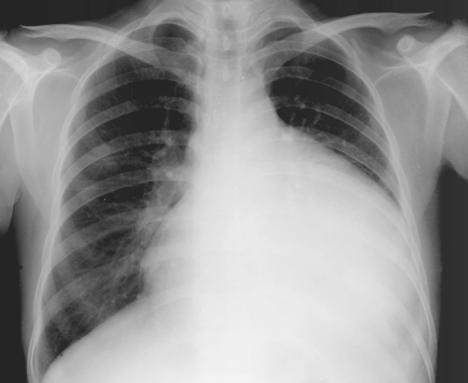An x-ray of a Pericardial effusion. Photograph: wikidoc.org
"Pericarditis" - Inflammation of the pericardium, which often leads to chest pain and fever. There may also be an increased amount of fluid (effusion) in the pericardial space, which may restrict the heart. Long-term inflammation can cause constrictive pericarditis, a condition in which the pericardium becomes scarred, thickens, and contracts, interfering with the heart's action.
Causes of pericarditis include infection: myocardial infarction; cancer spreading from another site; and injury to the pericardium. The disorder may accompany rheumatoid arthritis, systemic lupus erythematosus, and kideny failure.
Pericarditis causes pain behind the breastbone, and sometimes in the neck and shoulders. There may also be a fever. Constrictive pericarditis causes oedema of the legs and abdomen.
Diagnosis is made from a physical examination and an ECG and chest X-rays or echocardiography. If possible, treatment is aimed at the cause. Analgesic drugs or anti-inflammatory drugs may be given. If an effusion is present, fluid may be drawn off through a needle. In constructive pericarditis, part of the pericardium may be removed.
"pericarditis". British Medical Association (2007). Illustrated Medical Dictionary. 2nd ed. London: Dorling Kindersley (DK). p440.

No comments:
Post a Comment